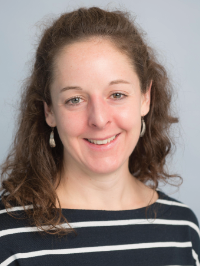
Principal Investigator
B.Sc. [Kinesiology] (University of Calgary)
M.A. [Kinesiology] (University of British Columbia)
Ph.D. [Kinesiology] (University of British Columbia)
Associate Professor, School of Kinesiology, Faculty of Education, UBC
Research Interests
community-based research; Digital qualitative research; Exercise; Inclusion; Paralympics; Physical activity; Qualitative methodologies; social participation; Social support; SportDr. Bundon’s research spans the sociology of sport and critical disabilities studies. Working from community-based, participatory research frameworks, she uses innovative (and often digital qualitative methods) to explore the intersections of sport, physical activity, health, disability and social inclusion. She was recently featured by UBC Kinesiology discussing the importance of community conversation, which you can read about here.
Dr. Bundon is an Assistant Professor in UBC’s School of Kinesiology and a Principal Investigator at ICORD. With a keen interest on building opportunities for community and physical activity, Dr. Bundon looks forward to working with people with SCI to facilitate lasting positive changes.
Awards
Some of Dr. Bundon’s major awards and accomplishments include:
- Paper of the Year (Adapted Physical Activity Quarterly, 2024)
Current Lab Members
| Masters Students | Ph.D. Students | Postdoctoral Fellows | Administrative Staff |
|---|---|---|---|
| Kailan Tang | Lisa Trainor | Shannon Herrick | Ljudmila Zaletelj |
| Priya Dhaliwal | Stephanie Stresing | Sara Kramers | |
| Samantha Graham | Pegah Derakhshan |
Current Opportunities in the Lab
There are currently no opportunities in Dr. Bundon’s lab. However, students are invited to applying for work and volunteer positions with PARC. She also supervises graduate students in the School of Kinesiology (MA and PhD program) – details of the program are available here and potential students are encouraged to contact Dr. Bundon to discuss their research interests and future studies.
Recent Collaborations
Dr. Bundon is currently the PI on a SSHRC Partnership Development Grant. With research parters at viaSport British Columbia, they are exploring how the BC sport sector can be made more inclusive of people with disabilities. This includes looking at how to support provincial sport organizations and regional actors to implement disability inclusive policies and exploring models for funding disability sport. It also includes working with members of disability communities to hear what they want and need to feel included. More information on this work can be found on viaSport’s persons with disabilities page.
With Dr. David Howe of Western University, graduate student Nikolaus Dean (UBC) and research associate Natalie Abele, Dr. Bundon is involved in research that explores the past, present and future of women in the Paralympic Movement. Funded by a SSHRC Insight Development Grant, this work looks at the strategies, policies and initiatives that contribute to or impeded gender equity in parasport.
Dr. Bundon maintains an affiliation with the Peter Harrison Centre for Disability Sport at Loughborough University (UK). As a member of this research group, Dr. Bundon has been involved in projects that investigate the experiences of retiring Paralympians, the design and manufacturing of racing wheelchairs and handcycles, and the implementation of a 3 versus 3 model for wheelchair basketball. This research has included collaborations with the English Institute of Sport and other UK stakeholders.
Major Findings:
While there is a tendency to think of inclusion/exclusion as a binary concept, Dr. Bundon’s work really explores how it is possible for someone to be both included and excluded from sport at the same time. People with disabilities are often ‘included’ in sport in ways that limit their participation based on pre-conceived notions of what they want to do and can do. Drawing on theories and concepts from Critical Disability Studies, her research explores how inclusion and exclusion are produced and reproduced in sport, exercise and physical activity contexts. It calls out disablism (the discrimination of people based on disability) and ableism (systems that assume ‘ability’ and ‘able-bodieness’ are normal and desirable). Dr. Bundon promotes evidence-based and empirically-informed ways of creating more opportunities for more people to experience inclusion in and through sport, exercise and physical activity.
Techniques Employed in the lab:
Broadly speaking, Dr. Bundon’s methods are qualitative and draw heavily on ethnographic and community-based research traditions. She also has a strong interest and practice in emerging ‘Digital Qualitative Methods.’ Specific methods/methodologies include:
- Semi-structured interviews
- Qualitative methods involving social media (analysis and participant engagement)
- Participant observation
- (Feminist) Participatory Action Research (PAR and FPAR)
- Digital storytelling
- Photo-Elicitation and Photovoice
Affiliation with organizations and societies:
- School of Kinesiology, UBC
- Peter Harrison Centre for Disability Sport, Loughborough University, UK (affiliate member)
- International Society of Qualitative Research in Sport and Exercise (committee member)
- Canadian Paralympic Committee ‘Para-sport research network’ (member)
Recent publications
- Stevenson, C et al.. 2025. Retired para athletes hold limited leadership roles in Canadian national sport federations.. Front Sports Act Living. doi: 10.3389/fspor.2025.1695467.
- Vecchione, J, Bundon, A, Madill, C, Hodges, NJ. 2025. How high-performance practitioners think and intervene to change technique.. Psychol Sport Exerc. doi: 10.1016/j.psychsport.2025.102906.
- McGannon, KR, Bundon, A, Hladun, W, Pegoraro, A. 2025. Negotiating digital identities: Small story narrative analysis of queer and heterosexual elite hockey playing mothers' self-portrayals on Instagram.. Psychol Sport Exerc. doi: 10.1016/j.psychsport.2025.102881.
- Herrick, SSC, Bennett, EV, Bundon, A. 2025. Feeling 'not enough' or 'too much': Exploring how LGBTQ+ adults experiencing disability navigate Canadian health contexts.. J Health Psychol. doi: 10.1177/13591053251327263.
- McGannon, KR, Kulkarni, S, Hladun, W, Bundon, A, Pegoraro, A. 2025. Exposing a Motherhood Penalty in Sport: A Feminist Narrative Inquiry of Media Stories of Canadian Athlete Mothers' Journeys to the 2020 Tokyo Games.. Commun Sport. doi: 10.1177/21674795231187916.

